Analysis of Ethical Principles and Public Health Laws
VerifiedAdded on 2022/12/14
|7
|2185
|343
Essay
AI Summary
This essay delves into the ethical principles that govern public health laws, exploring concepts such as justice, beneficence, non-maleficence, autonomy, efficiency, and fidelity. It examines how these principles support or are violated by specific laws, providing concrete examples like the Elder Justice Act, the Social Security Amendment Act, and laws related to informed consent. The paper further discusses the balance between respecting individual rights and maintaining community health, highlighting the complexities and potential conflicts that arise in applying ethical principles within the framework of public health regulations. The essay utilizes case studies and legal analysis to demonstrate the practical application of these principles in healthcare settings and policy-making, offering a comprehensive overview of public health ethics.
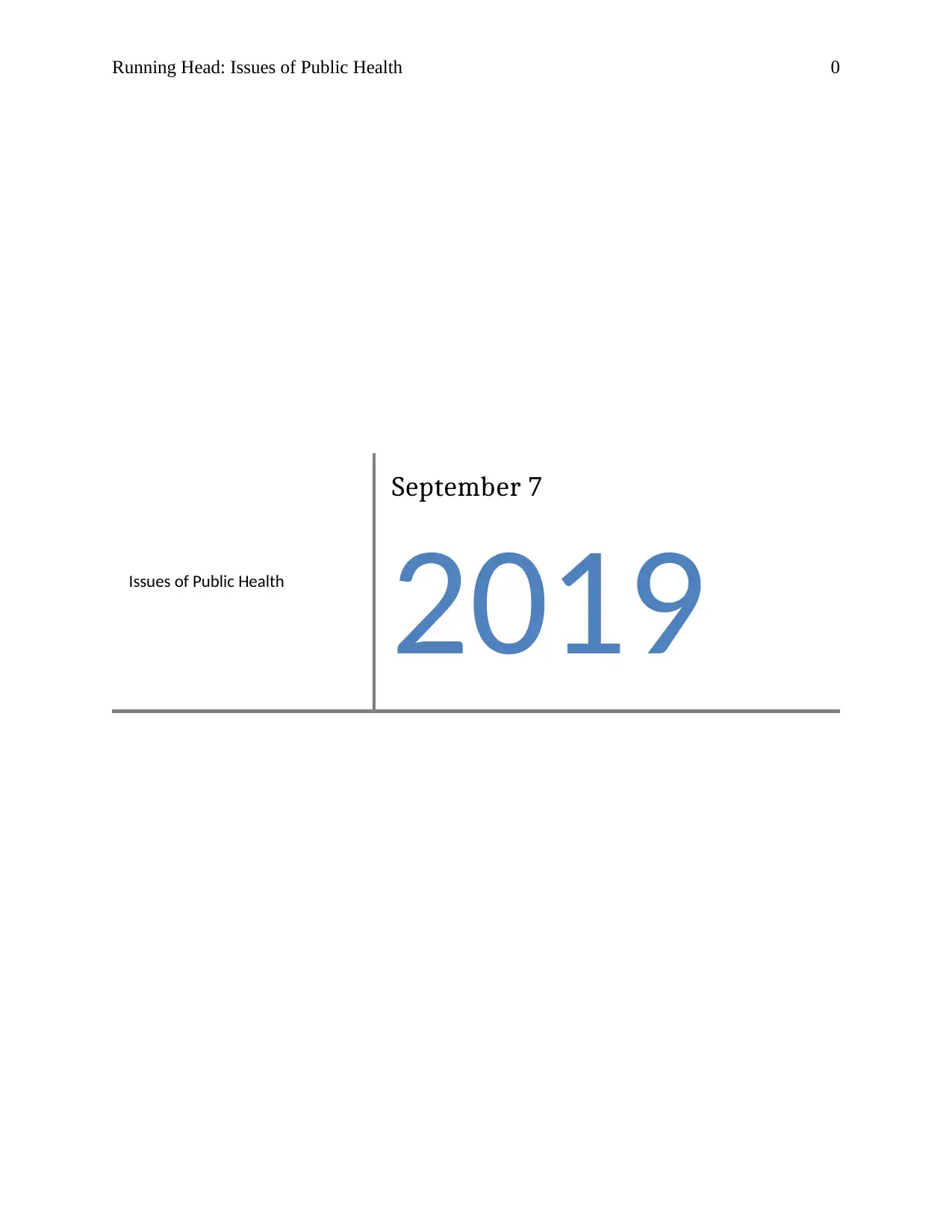
Running Head: Issues of Public Health 0
Issues of Public Health
September 7
2019
Issues of Public Health
September 7
2019
Paraphrase This Document
Need a fresh take? Get an instant paraphrase of this document with our AI Paraphraser
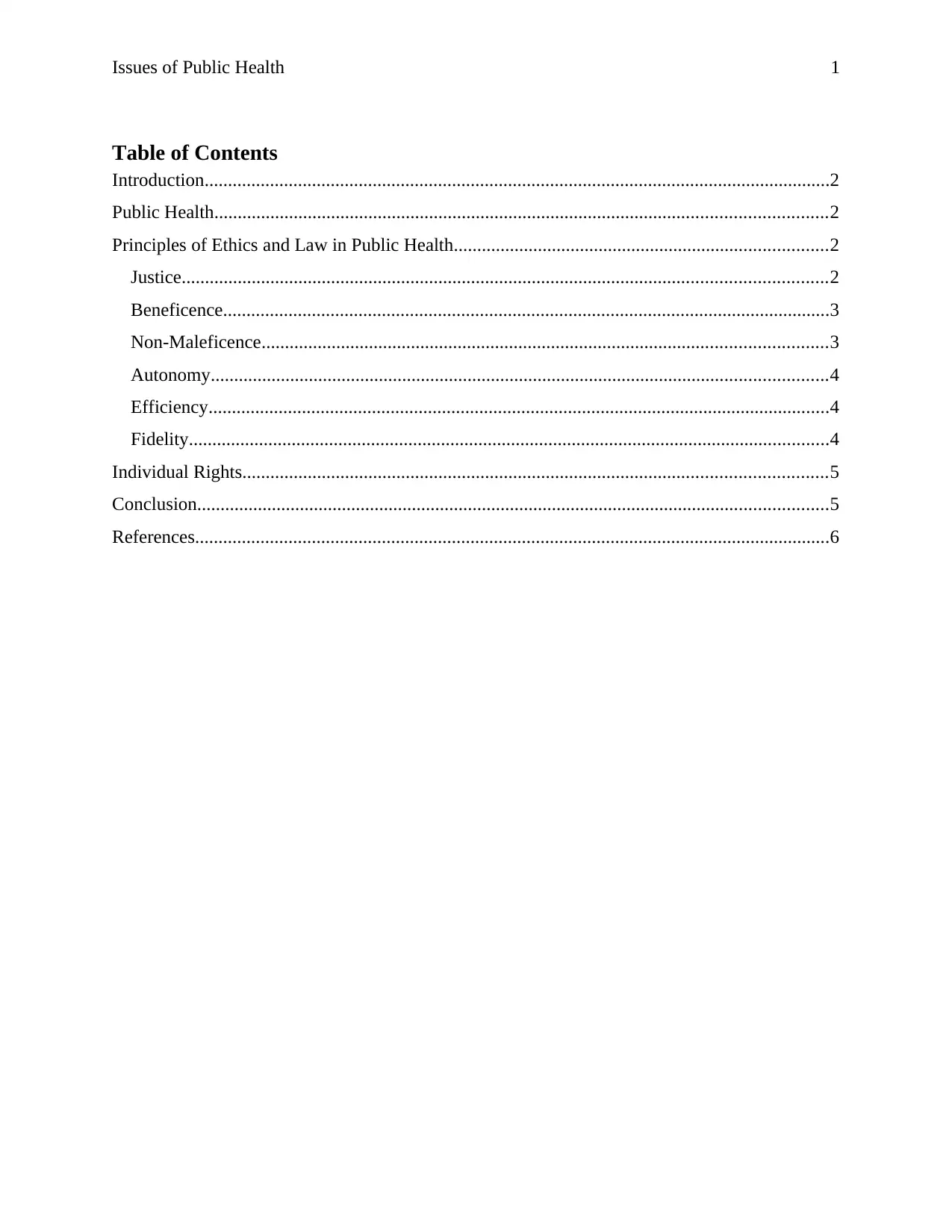
Issues of Public Health 1
Table of Contents
Introduction......................................................................................................................................2
Public Health...................................................................................................................................2
Principles of Ethics and Law in Public Health................................................................................2
Justice..........................................................................................................................................2
Beneficence..................................................................................................................................3
Non-Maleficence.........................................................................................................................3
Autonomy....................................................................................................................................4
Efficiency.....................................................................................................................................4
Fidelity.........................................................................................................................................4
Individual Rights.............................................................................................................................5
Conclusion.......................................................................................................................................5
References........................................................................................................................................6
Table of Contents
Introduction......................................................................................................................................2
Public Health...................................................................................................................................2
Principles of Ethics and Law in Public Health................................................................................2
Justice..........................................................................................................................................2
Beneficence..................................................................................................................................3
Non-Maleficence.........................................................................................................................3
Autonomy....................................................................................................................................4
Efficiency.....................................................................................................................................4
Fidelity.........................................................................................................................................4
Individual Rights.............................................................................................................................5
Conclusion.......................................................................................................................................5
References........................................................................................................................................6
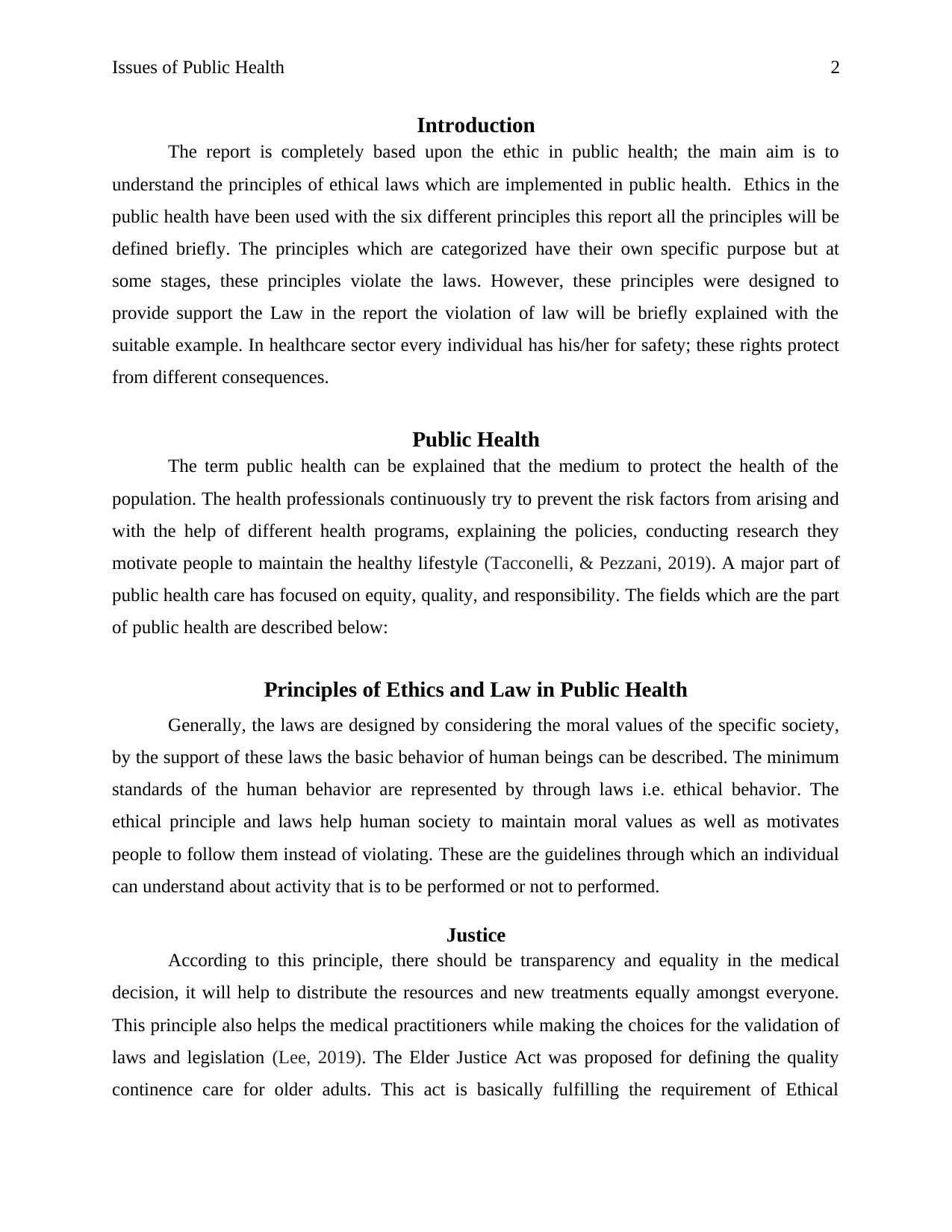
Issues of Public Health 2
Introduction
The report is completely based upon the ethic in public health; the main aim is to
understand the principles of ethical laws which are implemented in public health. Ethics in the
public health have been used with the six different principles this report all the principles will be
defined briefly. The principles which are categorized have their own specific purpose but at
some stages, these principles violate the laws. However, these principles were designed to
provide support the Law in the report the violation of law will be briefly explained with the
suitable example. In healthcare sector every individual has his/her for safety; these rights protect
from different consequences.
Public Health
The term public health can be explained that the medium to protect the health of the
population. The health professionals continuously try to prevent the risk factors from arising and
with the help of different health programs, explaining the policies, conducting research they
motivate people to maintain the healthy lifestyle (Tacconelli, & Pezzani, 2019). A major part of
public health care has focused on equity, quality, and responsibility. The fields which are the part
of public health are described below:
Principles of Ethics and Law in Public Health
Generally, the laws are designed by considering the moral values of the specific society,
by the support of these laws the basic behavior of human beings can be described. The minimum
standards of the human behavior are represented by through laws i.e. ethical behavior. The
ethical principle and laws help human society to maintain moral values as well as motivates
people to follow them instead of violating. These are the guidelines through which an individual
can understand about activity that is to be performed or not to performed.
Justice
According to this principle, there should be transparency and equality in the medical
decision, it will help to distribute the resources and new treatments equally amongst everyone.
This principle also helps the medical practitioners while making the choices for the validation of
laws and legislation (Lee, 2019). The Elder Justice Act was proposed for defining the quality
continence care for older adults. This act is basically fulfilling the requirement of Ethical
Introduction
The report is completely based upon the ethic in public health; the main aim is to
understand the principles of ethical laws which are implemented in public health. Ethics in the
public health have been used with the six different principles this report all the principles will be
defined briefly. The principles which are categorized have their own specific purpose but at
some stages, these principles violate the laws. However, these principles were designed to
provide support the Law in the report the violation of law will be briefly explained with the
suitable example. In healthcare sector every individual has his/her for safety; these rights protect
from different consequences.
Public Health
The term public health can be explained that the medium to protect the health of the
population. The health professionals continuously try to prevent the risk factors from arising and
with the help of different health programs, explaining the policies, conducting research they
motivate people to maintain the healthy lifestyle (Tacconelli, & Pezzani, 2019). A major part of
public health care has focused on equity, quality, and responsibility. The fields which are the part
of public health are described below:
Principles of Ethics and Law in Public Health
Generally, the laws are designed by considering the moral values of the specific society,
by the support of these laws the basic behavior of human beings can be described. The minimum
standards of the human behavior are represented by through laws i.e. ethical behavior. The
ethical principle and laws help human society to maintain moral values as well as motivates
people to follow them instead of violating. These are the guidelines through which an individual
can understand about activity that is to be performed or not to performed.
Justice
According to this principle, there should be transparency and equality in the medical
decision, it will help to distribute the resources and new treatments equally amongst everyone.
This principle also helps the medical practitioners while making the choices for the validation of
laws and legislation (Lee, 2019). The Elder Justice Act was proposed for defining the quality
continence care for older adults. This act is basically fulfilling the requirement of Ethical
⊘ This is a preview!⊘
Do you want full access?
Subscribe today to unlock all pages.

Trusted by 1+ million students worldwide
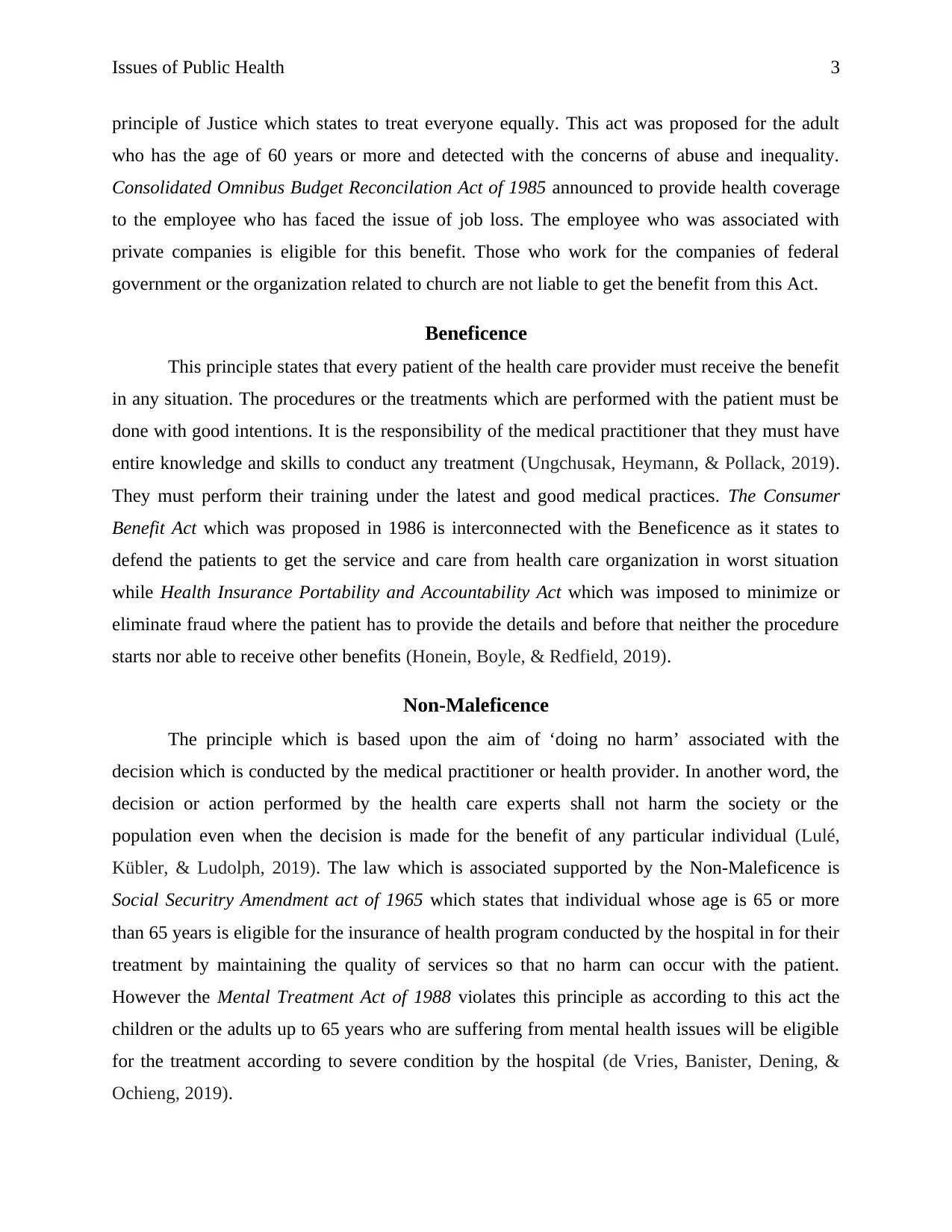
Issues of Public Health 3
principle of Justice which states to treat everyone equally. This act was proposed for the adult
who has the age of 60 years or more and detected with the concerns of abuse and inequality.
Consolidated Omnibus Budget Reconcilation Act of 1985 announced to provide health coverage
to the employee who has faced the issue of job loss. The employee who was associated with
private companies is eligible for this benefit. Those who work for the companies of federal
government or the organization related to church are not liable to get the benefit from this Act.
Beneficence
This principle states that every patient of the health care provider must receive the benefit
in any situation. The procedures or the treatments which are performed with the patient must be
done with good intentions. It is the responsibility of the medical practitioner that they must have
entire knowledge and skills to conduct any treatment (Ungchusak, Heymann, & Pollack, 2019).
They must perform their training under the latest and good medical practices. The Consumer
Benefit Act which was proposed in 1986 is interconnected with the Beneficence as it states to
defend the patients to get the service and care from health care organization in worst situation
while Health Insurance Portability and Accountability Act which was imposed to minimize or
eliminate fraud where the patient has to provide the details and before that neither the procedure
starts nor able to receive other benefits (Honein, Boyle, & Redfield, 2019).
Non-Maleficence
The principle which is based upon the aim of ‘doing no harm’ associated with the
decision which is conducted by the medical practitioner or health provider. In another word, the
decision or action performed by the health care experts shall not harm the society or the
population even when the decision is made for the benefit of any particular individual (Lulé,
Kübler, & Ludolph, 2019). The law which is associated supported by the Non-Maleficence is
Social Securitry Amendment act of 1965 which states that individual whose age is 65 or more
than 65 years is eligible for the insurance of health program conducted by the hospital in for their
treatment by maintaining the quality of services so that no harm can occur with the patient.
However the Mental Treatment Act of 1988 violates this principle as according to this act the
children or the adults up to 65 years who are suffering from mental health issues will be eligible
for the treatment according to severe condition by the hospital (de Vries, Banister, Dening, &
Ochieng, 2019).
principle of Justice which states to treat everyone equally. This act was proposed for the adult
who has the age of 60 years or more and detected with the concerns of abuse and inequality.
Consolidated Omnibus Budget Reconcilation Act of 1985 announced to provide health coverage
to the employee who has faced the issue of job loss. The employee who was associated with
private companies is eligible for this benefit. Those who work for the companies of federal
government or the organization related to church are not liable to get the benefit from this Act.
Beneficence
This principle states that every patient of the health care provider must receive the benefit
in any situation. The procedures or the treatments which are performed with the patient must be
done with good intentions. It is the responsibility of the medical practitioner that they must have
entire knowledge and skills to conduct any treatment (Ungchusak, Heymann, & Pollack, 2019).
They must perform their training under the latest and good medical practices. The Consumer
Benefit Act which was proposed in 1986 is interconnected with the Beneficence as it states to
defend the patients to get the service and care from health care organization in worst situation
while Health Insurance Portability and Accountability Act which was imposed to minimize or
eliminate fraud where the patient has to provide the details and before that neither the procedure
starts nor able to receive other benefits (Honein, Boyle, & Redfield, 2019).
Non-Maleficence
The principle which is based upon the aim of ‘doing no harm’ associated with the
decision which is conducted by the medical practitioner or health provider. In another word, the
decision or action performed by the health care experts shall not harm the society or the
population even when the decision is made for the benefit of any particular individual (Lulé,
Kübler, & Ludolph, 2019). The law which is associated supported by the Non-Maleficence is
Social Securitry Amendment act of 1965 which states that individual whose age is 65 or more
than 65 years is eligible for the insurance of health program conducted by the hospital in for their
treatment by maintaining the quality of services so that no harm can occur with the patient.
However the Mental Treatment Act of 1988 violates this principle as according to this act the
children or the adults up to 65 years who are suffering from mental health issues will be eligible
for the treatment according to severe condition by the hospital (de Vries, Banister, Dening, &
Ochieng, 2019).
Paraphrase This Document
Need a fresh take? Get an instant paraphrase of this document with our AI Paraphraser
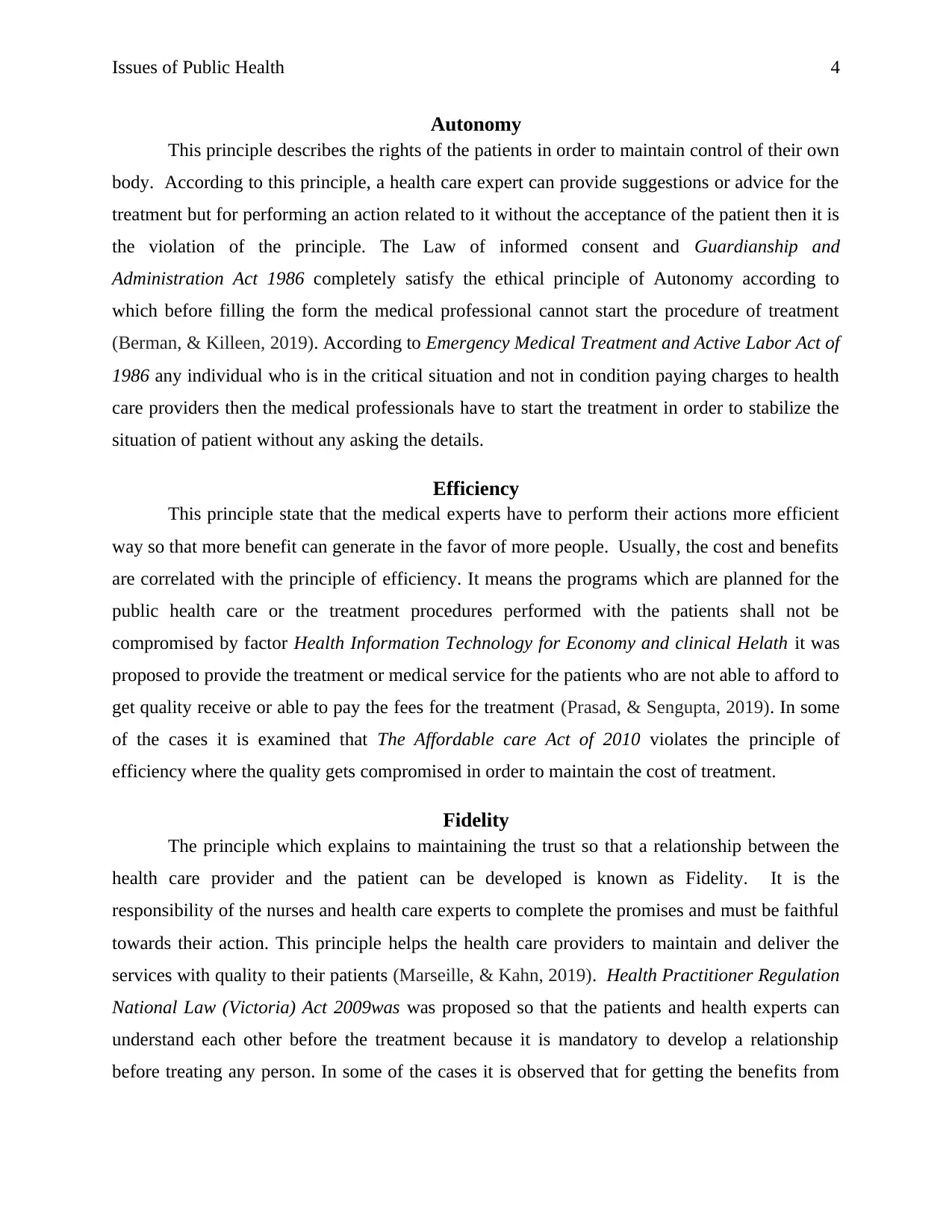
Issues of Public Health 4
Autonomy
This principle describes the rights of the patients in order to maintain control of their own
body. According to this principle, a health care expert can provide suggestions or advice for the
treatment but for performing an action related to it without the acceptance of the patient then it is
the violation of the principle. The Law of informed consent and Guardianship and
Administration Act 1986 completely satisfy the ethical principle of Autonomy according to
which before filling the form the medical professional cannot start the procedure of treatment
(Berman, & Killeen, 2019). According to Emergency Medical Treatment and Active Labor Act of
1986 any individual who is in the critical situation and not in condition paying charges to health
care providers then the medical professionals have to start the treatment in order to stabilize the
situation of patient without any asking the details.
Efficiency
This principle state that the medical experts have to perform their actions more efficient
way so that more benefit can generate in the favor of more people. Usually, the cost and benefits
are correlated with the principle of efficiency. It means the programs which are planned for the
public health care or the treatment procedures performed with the patients shall not be
compromised by factor Health Information Technology for Economy and clinical Helath it was
proposed to provide the treatment or medical service for the patients who are not able to afford to
get quality receive or able to pay the fees for the treatment (Prasad, & Sengupta, 2019). In some
of the cases it is examined that The Affordable care Act of 2010 violates the principle of
efficiency where the quality gets compromised in order to maintain the cost of treatment.
Fidelity
The principle which explains to maintaining the trust so that a relationship between the
health care provider and the patient can be developed is known as Fidelity. It is the
responsibility of the nurses and health care experts to complete the promises and must be faithful
towards their action. This principle helps the health care providers to maintain and deliver the
services with quality to their patients (Marseille, & Kahn, 2019). Health Practitioner Regulation
National Law (Victoria) Act 2009was was proposed so that the patients and health experts can
understand each other before the treatment because it is mandatory to develop a relationship
before treating any person. In some of the cases it is observed that for getting the benefits from
Autonomy
This principle describes the rights of the patients in order to maintain control of their own
body. According to this principle, a health care expert can provide suggestions or advice for the
treatment but for performing an action related to it without the acceptance of the patient then it is
the violation of the principle. The Law of informed consent and Guardianship and
Administration Act 1986 completely satisfy the ethical principle of Autonomy according to
which before filling the form the medical professional cannot start the procedure of treatment
(Berman, & Killeen, 2019). According to Emergency Medical Treatment and Active Labor Act of
1986 any individual who is in the critical situation and not in condition paying charges to health
care providers then the medical professionals have to start the treatment in order to stabilize the
situation of patient without any asking the details.
Efficiency
This principle state that the medical experts have to perform their actions more efficient
way so that more benefit can generate in the favor of more people. Usually, the cost and benefits
are correlated with the principle of efficiency. It means the programs which are planned for the
public health care or the treatment procedures performed with the patients shall not be
compromised by factor Health Information Technology for Economy and clinical Helath it was
proposed to provide the treatment or medical service for the patients who are not able to afford to
get quality receive or able to pay the fees for the treatment (Prasad, & Sengupta, 2019). In some
of the cases it is examined that The Affordable care Act of 2010 violates the principle of
efficiency where the quality gets compromised in order to maintain the cost of treatment.
Fidelity
The principle which explains to maintaining the trust so that a relationship between the
health care provider and the patient can be developed is known as Fidelity. It is the
responsibility of the nurses and health care experts to complete the promises and must be faithful
towards their action. This principle helps the health care providers to maintain and deliver the
services with quality to their patients (Marseille, & Kahn, 2019). Health Practitioner Regulation
National Law (Victoria) Act 2009was was proposed so that the patients and health experts can
understand each other before the treatment because it is mandatory to develop a relationship
before treating any person. In some of the cases it is observed that for getting the benefits from
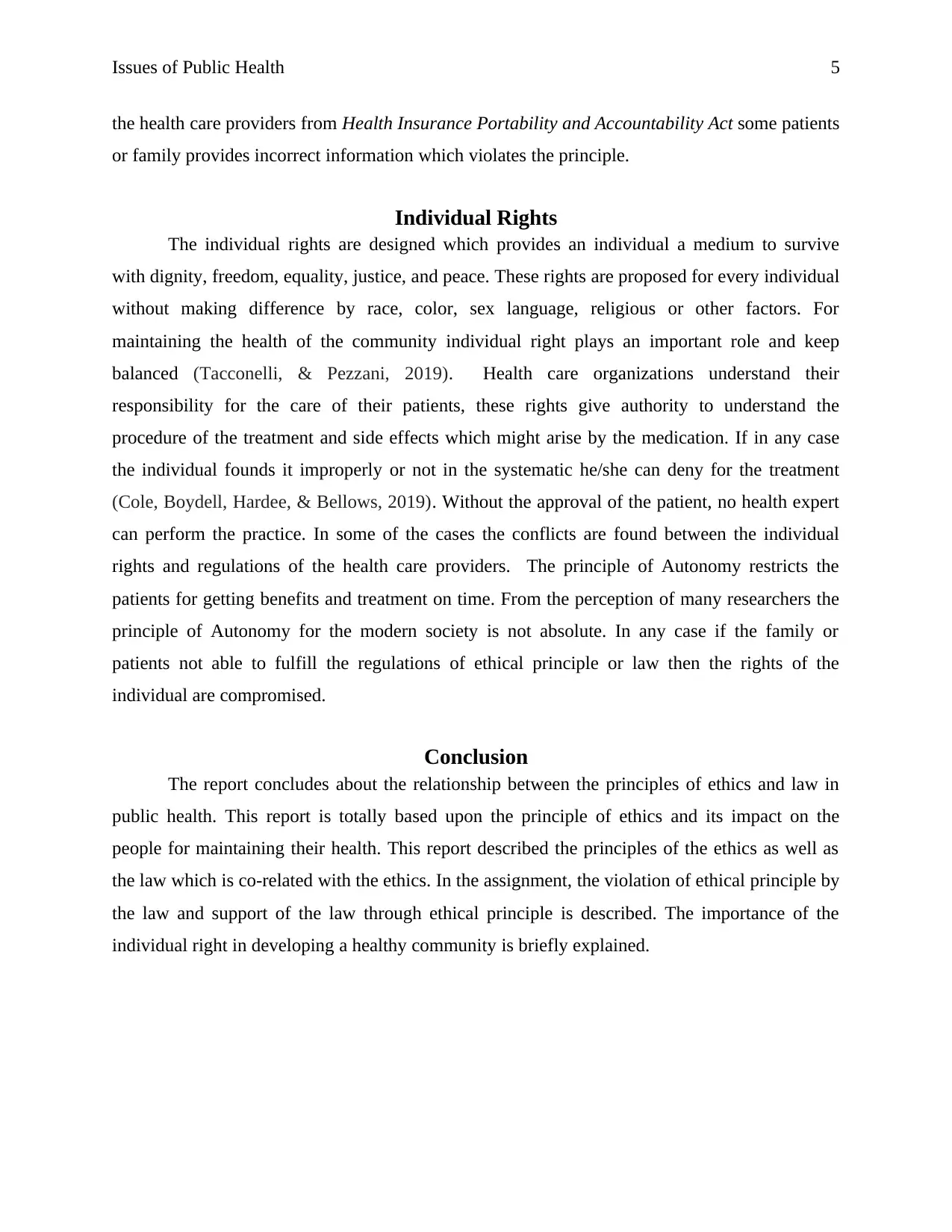
Issues of Public Health 5
the health care providers from Health Insurance Portability and Accountability Act some patients
or family provides incorrect information which violates the principle.
Individual Rights
The individual rights are designed which provides an individual a medium to survive
with dignity, freedom, equality, justice, and peace. These rights are proposed for every individual
without making difference by race, color, sex language, religious or other factors. For
maintaining the health of the community individual right plays an important role and keep
balanced (Tacconelli, & Pezzani, 2019). Health care organizations understand their
responsibility for the care of their patients, these rights give authority to understand the
procedure of the treatment and side effects which might arise by the medication. If in any case
the individual founds it improperly or not in the systematic he/she can deny for the treatment
(Cole, Boydell, Hardee, & Bellows, 2019). Without the approval of the patient, no health expert
can perform the practice. In some of the cases the conflicts are found between the individual
rights and regulations of the health care providers. The principle of Autonomy restricts the
patients for getting benefits and treatment on time. From the perception of many researchers the
principle of Autonomy for the modern society is not absolute. In any case if the family or
patients not able to fulfill the regulations of ethical principle or law then the rights of the
individual are compromised.
Conclusion
The report concludes about the relationship between the principles of ethics and law in
public health. This report is totally based upon the principle of ethics and its impact on the
people for maintaining their health. This report described the principles of the ethics as well as
the law which is co-related with the ethics. In the assignment, the violation of ethical principle by
the law and support of the law through ethical principle is described. The importance of the
individual right in developing a healthy community is briefly explained.
the health care providers from Health Insurance Portability and Accountability Act some patients
or family provides incorrect information which violates the principle.
Individual Rights
The individual rights are designed which provides an individual a medium to survive
with dignity, freedom, equality, justice, and peace. These rights are proposed for every individual
without making difference by race, color, sex language, religious or other factors. For
maintaining the health of the community individual right plays an important role and keep
balanced (Tacconelli, & Pezzani, 2019). Health care organizations understand their
responsibility for the care of their patients, these rights give authority to understand the
procedure of the treatment and side effects which might arise by the medication. If in any case
the individual founds it improperly or not in the systematic he/she can deny for the treatment
(Cole, Boydell, Hardee, & Bellows, 2019). Without the approval of the patient, no health expert
can perform the practice. In some of the cases the conflicts are found between the individual
rights and regulations of the health care providers. The principle of Autonomy restricts the
patients for getting benefits and treatment on time. From the perception of many researchers the
principle of Autonomy for the modern society is not absolute. In any case if the family or
patients not able to fulfill the regulations of ethical principle or law then the rights of the
individual are compromised.
Conclusion
The report concludes about the relationship between the principles of ethics and law in
public health. This report is totally based upon the principle of ethics and its impact on the
people for maintaining their health. This report described the principles of the ethics as well as
the law which is co-related with the ethics. In the assignment, the violation of ethical principle by
the law and support of the law through ethical principle is described. The importance of the
individual right in developing a healthy community is briefly explained.
⊘ This is a preview!⊘
Do you want full access?
Subscribe today to unlock all pages.

Trusted by 1+ million students worldwide
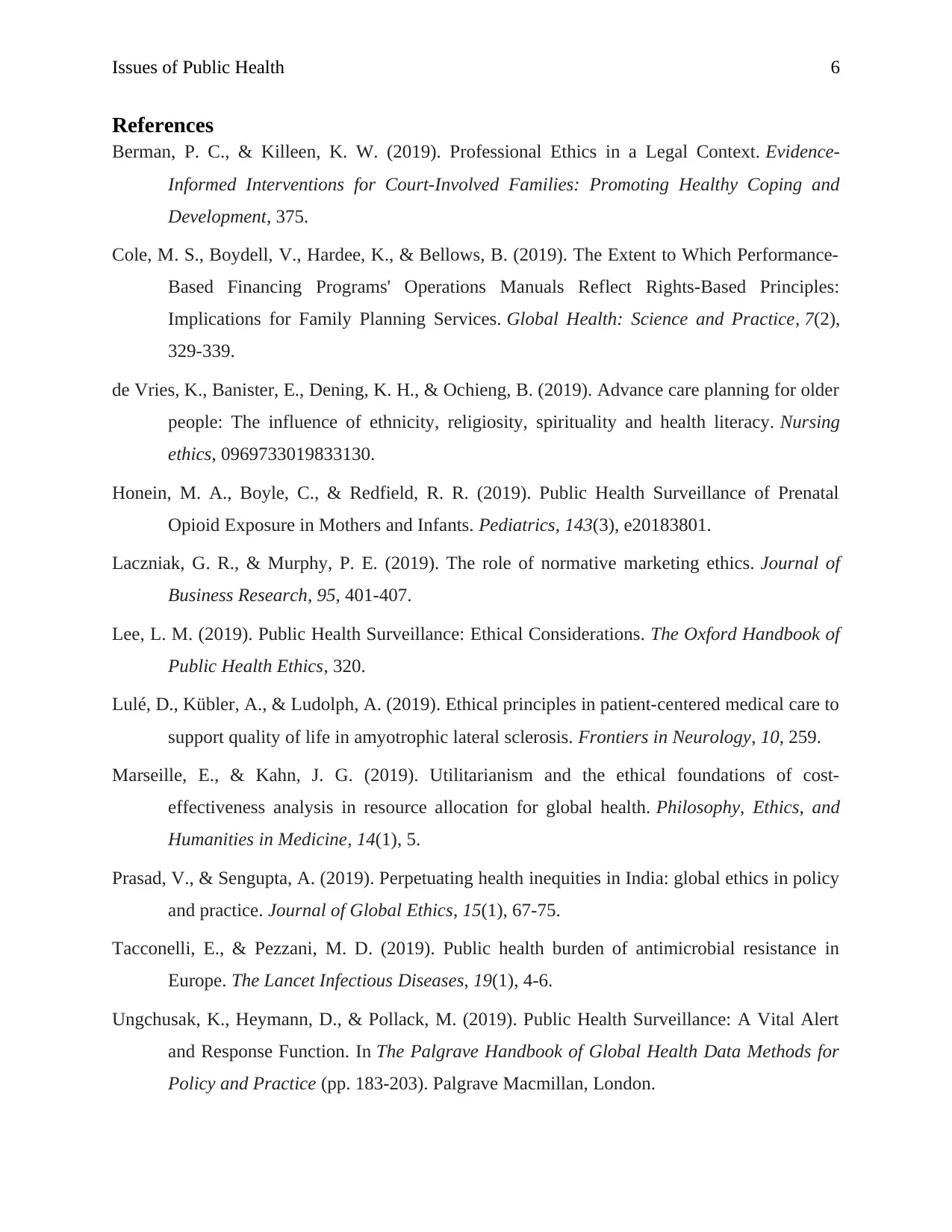
Issues of Public Health 6
References
Berman, P. C., & Killeen, K. W. (2019). Professional Ethics in a Legal Context. Evidence-
Informed Interventions for Court-Involved Families: Promoting Healthy Coping and
Development, 375.
Cole, M. S., Boydell, V., Hardee, K., & Bellows, B. (2019). The Extent to Which Performance-
Based Financing Programs' Operations Manuals Reflect Rights-Based Principles:
Implications for Family Planning Services. Global Health: Science and Practice, 7(2),
329-339.
de Vries, K., Banister, E., Dening, K. H., & Ochieng, B. (2019). Advance care planning for older
people: The influence of ethnicity, religiosity, spirituality and health literacy. Nursing
ethics, 0969733019833130.
Honein, M. A., Boyle, C., & Redfield, R. R. (2019). Public Health Surveillance of Prenatal
Opioid Exposure in Mothers and Infants. Pediatrics, 143(3), e20183801.
Laczniak, G. R., & Murphy, P. E. (2019). The role of normative marketing ethics. Journal of
Business Research, 95, 401-407.
Lee, L. M. (2019). Public Health Surveillance: Ethical Considerations. The Oxford Handbook of
Public Health Ethics, 320.
Lulé, D., Kübler, A., & Ludolph, A. (2019). Ethical principles in patient-centered medical care to
support quality of life in amyotrophic lateral sclerosis. Frontiers in Neurology, 10, 259.
Marseille, E., & Kahn, J. G. (2019). Utilitarianism and the ethical foundations of cost-
effectiveness analysis in resource allocation for global health. Philosophy, Ethics, and
Humanities in Medicine, 14(1), 5.
Prasad, V., & Sengupta, A. (2019). Perpetuating health inequities in India: global ethics in policy
and practice. Journal of Global Ethics, 15(1), 67-75.
Tacconelli, E., & Pezzani, M. D. (2019). Public health burden of antimicrobial resistance in
Europe. The Lancet Infectious Diseases, 19(1), 4-6.
Ungchusak, K., Heymann, D., & Pollack, M. (2019). Public Health Surveillance: A Vital Alert
and Response Function. In The Palgrave Handbook of Global Health Data Methods for
Policy and Practice (pp. 183-203). Palgrave Macmillan, London.
References
Berman, P. C., & Killeen, K. W. (2019). Professional Ethics in a Legal Context. Evidence-
Informed Interventions for Court-Involved Families: Promoting Healthy Coping and
Development, 375.
Cole, M. S., Boydell, V., Hardee, K., & Bellows, B. (2019). The Extent to Which Performance-
Based Financing Programs' Operations Manuals Reflect Rights-Based Principles:
Implications for Family Planning Services. Global Health: Science and Practice, 7(2),
329-339.
de Vries, K., Banister, E., Dening, K. H., & Ochieng, B. (2019). Advance care planning for older
people: The influence of ethnicity, religiosity, spirituality and health literacy. Nursing
ethics, 0969733019833130.
Honein, M. A., Boyle, C., & Redfield, R. R. (2019). Public Health Surveillance of Prenatal
Opioid Exposure in Mothers and Infants. Pediatrics, 143(3), e20183801.
Laczniak, G. R., & Murphy, P. E. (2019). The role of normative marketing ethics. Journal of
Business Research, 95, 401-407.
Lee, L. M. (2019). Public Health Surveillance: Ethical Considerations. The Oxford Handbook of
Public Health Ethics, 320.
Lulé, D., Kübler, A., & Ludolph, A. (2019). Ethical principles in patient-centered medical care to
support quality of life in amyotrophic lateral sclerosis. Frontiers in Neurology, 10, 259.
Marseille, E., & Kahn, J. G. (2019). Utilitarianism and the ethical foundations of cost-
effectiveness analysis in resource allocation for global health. Philosophy, Ethics, and
Humanities in Medicine, 14(1), 5.
Prasad, V., & Sengupta, A. (2019). Perpetuating health inequities in India: global ethics in policy
and practice. Journal of Global Ethics, 15(1), 67-75.
Tacconelli, E., & Pezzani, M. D. (2019). Public health burden of antimicrobial resistance in
Europe. The Lancet Infectious Diseases, 19(1), 4-6.
Ungchusak, K., Heymann, D., & Pollack, M. (2019). Public Health Surveillance: A Vital Alert
and Response Function. In The Palgrave Handbook of Global Health Data Methods for
Policy and Practice (pp. 183-203). Palgrave Macmillan, London.
1 out of 7
Related Documents
Your All-in-One AI-Powered Toolkit for Academic Success.
+13062052269
info@desklib.com
Available 24*7 on WhatsApp / Email
![[object Object]](/_next/static/media/star-bottom.7253800d.svg)
Unlock your academic potential
Copyright © 2020–2026 A2Z Services. All Rights Reserved. Developed and managed by ZUCOL.





